|
|
|
Sort Order |
|
|
|
Items / Page
|
|
|
|
|
|
|
| Srl | Item |
| 1 |
ID:
126444
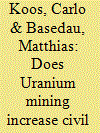

|
|
|
|
|
| Publication |
2013.
|
| Summary/Abstract |
We investigate whether uranium, similar to other resources, is associated with armed conflicts. The analysis uses grid cells in Africa to test this hypothesis. Results from logistic regressions reveal that uranium operations are not an independent conflict risk; however, it is significantly linked to local conflict events when interacting with ethnic exclusion. The analysis is supplemented by process tracing in four countries, where armed conflict broke out after uranium operations started (DR Congo, Central African Republic, Niger and South Africa). We find substantial evidence for a link only in the case of Niger. Our results suggest that uranium promotes intrastate conflict only under specific circumstances.
|
|
|
|
|
|
|
|
|
|
|
|
|
|
|
|
| 2 |
ID:
148934
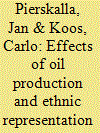

|
|
|
|
|
| Summary/Abstract |
A large qualitative literature on violent conflict in Nigeria has identified the importance of oil production and ethnicity as salient factors in understanding violence, especially in the oil-rich Niger Delta. This resonates with the broader literature on natural resources, ethnic exclusion, and conflict. This article advances existing research by providing the first highly disaggregated statistical analysis of oil, ethnicity, and violence for Nigerian Local Government Areas (LGAs). We test whether oil production in a weak state environment, and local groups’ access to governmental power, affect the level of violence in Nigeria. We employ unique disaggregated data on violent conflict events, proprietary data on oil production, and newly collected information on local ethnic groups’ access to the federal government for 774 LGAs. We find strong evidence that LGAs with oil infrastructure experience significantly more violence than others, while access to the federal government significantly reduces violence. We complement these findings with a qualitative investigation of violent conflicts in Nigeria.
|
|
|
|
|
|
|
|
|
|
|
|
|
|
|
|
| 3 |
ID:
173776
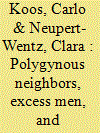

|
|
|
|
|
| Summary/Abstract |
We argue that polygyny creates a social imbalance where few, economically well-off men marry many wives and many poor men marry late or never. By definition, polygyny produces what we refer to as “excess men.” In order to gain material wealth, excess men are likely to raid, plunder, and rob neighboring ethnic groups. We test this hypothesis with georeferenced data on polygyny and intergroup conflict in rural Africa and find strong support. Drawing on Afrobarometer survey data, we explore the underlying mechanisms and find that young men who belong to polygynous groups feel that they are treated more unequally and are readier to use violence in comparison to those belonging to monogamous groups. Our article makes an important contribution to the peace, conflict, and development literature by emphasizing a fundamental aspect of human life: marriage and family.
|
|
|
|
|
|
|
|
|
|
|
|
|
|
|
|
| 4 |
ID:
154470
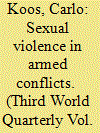

|
|
|
|
|
| Summary/Abstract |
Research on conflict-related sexual violence (CRSV) has grown rapidly over the last decade. This article consolidates existing social science research on CSRV according to two lines of inquiry: its causes and its consequences. Overall, research has considerably advanced our knowledge of the causes of CRSV, particularly in four aspects: purpose, context, individual motives and intra-group dynamics. However, there is a need to better understand the societal consequences of CRSV, in particular how it affects relations in families, and within and between communities. Overall there remains a shortage of empirical, in particular mixed-method, designs to produce research which is relevant for policymakers and practitioners.
|
|
|
|
|
|
|
|
|
|
|
|
|
|
|
|
| 5 |
ID:
180189
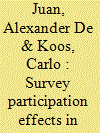

|
|
|
|
|
| Summary/Abstract |
Do survey participants in conflict zones respond differently if they have been interviewed before? Academic and policy interest in postwar political opinion has increased tremendously. One unexpected consequence of this surge of survey research is a growing probability that individuals will be interviewed multiple times. However, if participating in one survey causes respondents to change their attitudes or behavior, their subsequent survey responses may be biased in comparison to the rest of the sample population. Our article aims to investigate such ‘survey participation effects’ in conflict contexts. We draw on original survey data collected in the eastern Democratic Republic of Congo (DRC). In our representative sample, 18% of respondents report that they have been interviewed before. Multivariate analyses demonstrate that their stated attitudes on social relations, political institutions, gender norms, and wartime victimization differ substantively from the responses of first-time interviewees. Moreover, our analyses indicate that experienced respondents have specific response styles – in particular, a tendency to support extreme response options. While substantive bias in multivariate analyses seems to be rather rare, our findings indicate that researchers should be aware of the footprints of data collection efforts in areas frequently targeted by household and opinion surveys.
|
|
|
|
|
|
|
|
|
|
|
|
|
|
|
|
| 6 |
ID:
186336
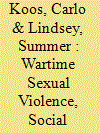

|
|
|
|
|
| Summary/Abstract |
Sexual violence by armed groups is common in civil wars. Qualitative studies have shown that victims and their families experience social stigmatization. Stigmatization is viewed as a central mechanism to social exclusion and disintegration impeding post-conflict social, political, and economic recovery. We provide new theory on the social conditions under which rape-related stigma intensifies and decreases. Drawing on an original population-based survey in eastern Democratic Republic of Congo, we find that victims and their families experience higher levels of stigma compared to unaffected families and these effects are dependent on community attitudes and norms. Furthermore, we find that humanitarian support interventions designed to address the social nature of stigma can reduce stigma. Our article significantly expands prior knowledge on a central mechanism in post-conflict recovery by providing a refined theory on wartime rape-related stigma and the role of humanitarian aid in mitigating negative effects based on representative data.
|
|
|
|
|
|
|
|
|
|
|
|
|
|
|
|
| 7 |
ID:
134990


|
|
|
|
|
| Summary/Abstract |
This article uses a collective-action framework to study the mobilization of the Arrow Boys (AB), a community defense militia in South Sudan. Drawing on general collective-action explanations, this article argues that the mobilization of the AB was facilitated by two factors: (1) a strong overlap of the fighter's private and the community's public benefit and (2) close social relationships and expectations within the community. The article supports these theoretical claims by, first, examining the scope conditions under which the AB formed and, second, drawing on individual interviews with AB members from Western Equatoria in South Sudan.
|
|
|
|
|
|
|
|
|
|
|
|
|
|
|
|
|
|
|
|
|